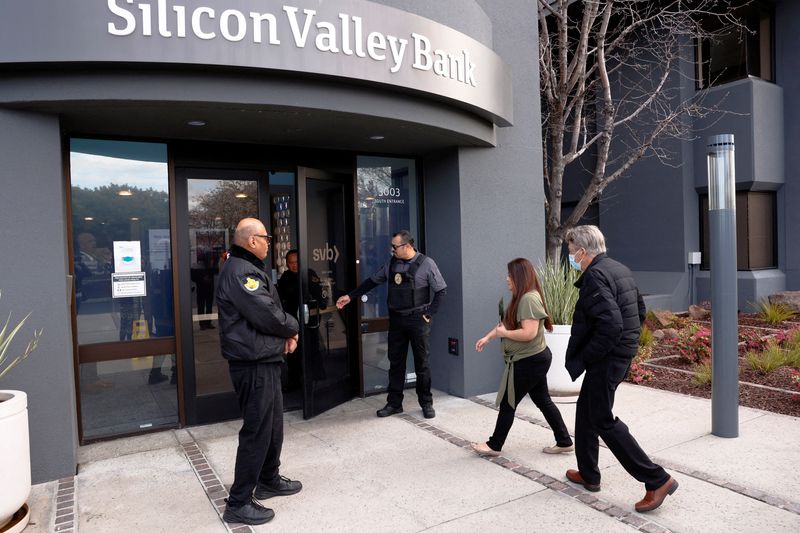(Reuters) - The failures of U.S. lenders Silicon Valley Bank (SVB) and Signature Bank (OTC:SBNY), followed by Credit Suisse's rescue, and the ensuing turmoil in world markets have re-ignited the recession risks that appeared to have abated just a few weeks ago.
Traders now bet the Federal Reserve is practically done hiking interest rates. Optimism that followed China's economic reopening and tumbling energy prices early this year has dimmed.
"The bigger, medium-term implication, of what's happened in the last month is that global growth will be far weaker in six months than we thought even just a few weeks ago," said Mike Riddell, senior fixed income portfolio manager at Allianz (ETR:ALVG) Global Investors.
Here's what some closely watched market indicators say about recession risks:
1/ CRUNCH TIME?
Central bankers are closely monitoring the potential for banking stress, on top of lending conditions that were already tightening, to trigger a credit crunch.
Fed chief Jerome Powell believes financial conditions have likely tightened more than traditional measures indicate. European Central Bank boss Christine Lagarde has also said the market turmoil may help fight inflation.
Goldman Sachs (NYSE:GS) reckons the tightening in bank lending standards it expects could subtract at least 0.25 to 0.5 percentage points from 2023 U.S. economic growth, equivalent to the impact of another 25-50 bps of Fed rate hikes.
AXA Investment Managers Chief Economist Gilles Moec noted small and big U.S. banks were borrowing heavily and holding onto cash, citing Fed data showing bank asset and liability positions as of March 15.
"There is a sizeable risk that the ongoing banking trouble triggers a 'sudden stop' in lending which would then send the economy into the sort of recession which would go beyond what is strictly needed to tame inflation," he added.
GRAPHIC: Bank stocks tumble after SVB, Signature Bank collapse- https://www.reuters.com/graphics/GLOBAL-BANKS/gdpzqkermvw/chart.png
2/ CUTS NOT HIKES
As the outlook darkens, traders were betting on Tuesday another Fed rate hike is a coin toss, with over 50 bps worth of rate cuts priced by year-end. ECB rates are seen peaking at around 3.4%, down from over 4% in early March
This has pushed shorter-dated borrowing costs down. U.S. two-year bond yields have dropped 80 bps in March, so yield curves are less inverted than prior to SVB's collapse.
While inverted yield curves, where long-dated borrowing costs are lower than shorter-dated ones, are good recession predictors, inversion has been followed by steepening as past recessions neared.
The U.S. two-year/10-year yield curve has steepened over 40 bps this month, the biggest monthly steepening since 2009.
GRAPHIC: Inverted U.S. yield curve steepens sharply- https://www.reuters.com/graphics/GLOBAL-MARKETS/egvbyjerdpq/chart.png
3/ BANK STOCK ROUT
World shares down just 0.1% in March and still sitting on gains this year seem to signal little recession risk, but worries are mounting under the surface.
Global bank stocks, which had outperformed the MSCI World Stock Index before the turmoil, are down nearly 15% this month. Sectors sensitive to the growth outlook such as real estate and oil and gas are also now underperforming.
Banking woes have also pushed up the risk premium on corporate debt. Euro high yield spreads over risk-free rates for example jumped 140 basis points from March 9 to March 20.
Still, those spreads remain below highs touched last year and far below levels reached during the 2020 COVID-19 pandemic, suggesting recession concerns in credit markets appear limited.
GRAPHIC: Economically sensitive sectors falter- https://fingfx.thomsonreuters.com/gfx/mkt/myvmobwnmvr/stocks%20march%2028.png
4/ DR. COPPER
Copper, nicknamed "Dr Copper" for its track record as a boom-bust indicator, is still up 7% this year. But it has lost some of its early-January gusto, reflecting market uncertainty and as demand from China - the world's largest commodity consumer - hasn't rocketed as expected after its re-opening.
The price ratio of copper to gold - seen as a gauge of risk appetite - hit its lowest in nearly seven months in March as investors ditched assets more closely linked to the underlying economy for safe havens.
5/ WHAT RECESSION?
Data is still delivering positive surprises at the highest rate since May 2022, a Citi index shows, suggesting economic statistics are not yet flashing a recession warning.
U.S. and euro zone business activity meanwhile accelerated more than expected in March.
"The (U.S.) data was largely collected after SVB's collapse, which suggests that the initial negative impact from uncertainty has been modest," said Kristoffer Kjær Lomholt, head of FX, corporate research and chief analyst at Danske Bank.
GRAPHIC: Global business activity strengthened in March Global business activity strengthened in March- https://www.reuters.com/graphics/GLOBAL-ECONOMY/PMI/gkvlwbaonpb/chart.png
